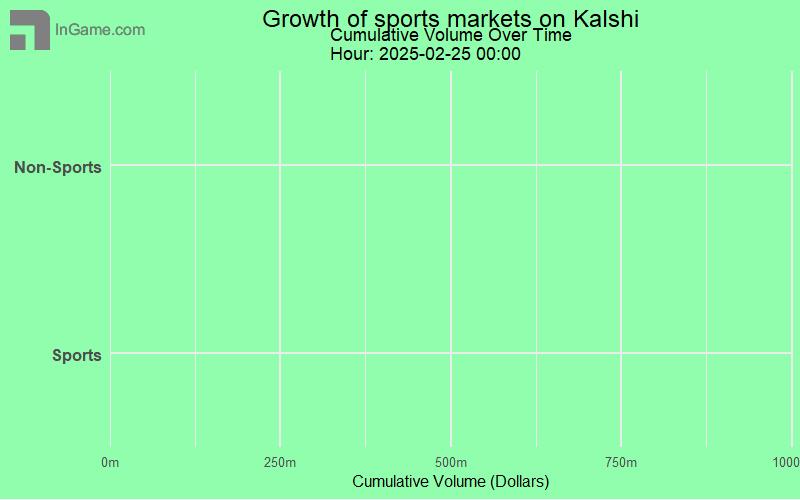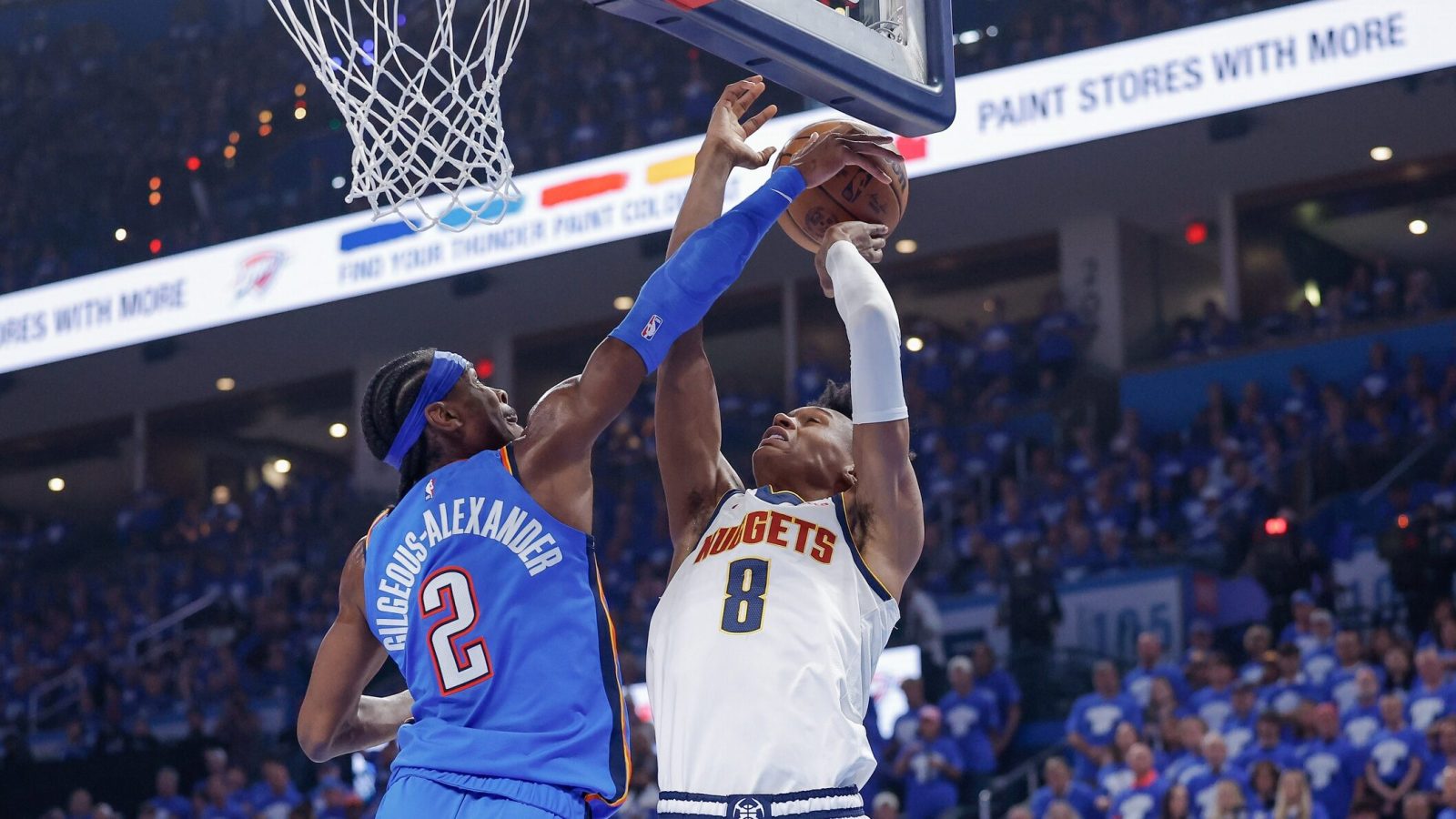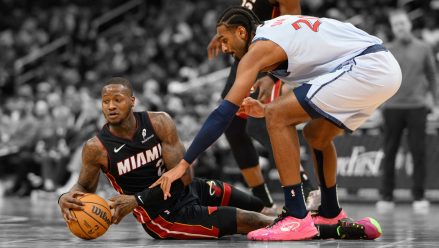More than three-quarters of Kalshi’s trading volume now comes from sports, data analyzed by InGame shows, raising questions about Kalshi’s attempts to distance itself from the notion that it’s a gambling platform.
New figures show that sports events now easily eclipse non-sports events on Kalshi, even on quiet days for sporting activity. They show that Kalshi’s reliance on sports exceeds even that of sportsbook giants DraftKings or FanDuel.
InGame analyzed every trade reported by Kalshi for the 82-day period between Feb. 25 — the earliest date for which data is listed on Kalshi’s market data page — and May 17. Data for April 1 was not available.
Analysis of the millions of trades, with volume exceeding over a billion dollars during this time period, shows how sports event contracts have rapidly grown to monopolize activity on Kalshi.
Kalshi is certified by the federal Commodity Futures Trading Commission (CFTC) as a futures exchange and the holder of a Designated Contract Market (DCM) license. It allows users to stake money on the outcome of both sporting events and non-sporting events, such as political elections and entertainment awards.
The process for Kalshi to create new markets is accomplished through self-certification, which has been questioned by authorities in some states, but so far has not been challenged by the CFTC.
Traditional legal sportsbooks are licensed by states and are beholden to a different set of regulations.
But new data examined by InGame illustrates similarities between Kalshi and those sports betting businesses, at least in terms of how customers use them.

Sports event contracts grow to dominate Kalshi
Over the 82-day period, sports event contracts easily made up the majority of contracts traded on Kalshi, comprising 70% of trading volume.
But perhaps even more stark is the growth of sports trades over that period. Over the first 21 days of the sample, sports made up only around a tenth of trading volume. But from March 18 — the first full day in which Kalshi’s single-game March Madness markets opened — onward, sports have dominated.
From March 18 on, sports have made up 75% of trading volume.
Even after the 2025 NCAA men’s college basketball tournament ended, sports products have continued to maintain their prominence among Kalshi activity. The last day in which more money was traded on non-sports markets than on sports was May 2.
More reliant on sports than DraftKings?
Based on Kalshi’s fee structure, sports appear to comprise an even higher share of revenue. Kalshi’s fees for sports contracts typically work out at slightly more than one cent on the dollar, while for non-sports markets the fee is around 0.9 cents. Trades on events with a close to 50/50 probability produce higher fees per dollar wagered than trades on events with a very high or very low implied probability.
The figures suggest that Kalshi makes a larger percentage of its money from sports than DraftKings or FanDuel — businesses that are almost synonymous with sports betting in the U.S.
In the first quarter, DraftKings made about $881 million in sports betting revenue, representing about 62% of its overall revenue for the period. Most of the remainder came from online casino activity, available so far in only seven U.S. jurisdictions. FanDuel’s $1.13 billion in sports betting revenue means sports made up a little under 70% of its first-quarter business, with online casino again making up the bulk of the remainder.
‘New asset class’?
The level of reliance on sports markets could add fuel to the argument that Kalshi’s offering is closer to gambling or sports betting than it is to being a financial product.
Kalshi describes itself as a “new asset class.” On the “About” page of its website, it notes that users can trade on events “from inflation, to fed rates, to unemployment, to will the government shut down.” While all of those options are available, the page does not mention any types of trades from its most popular category: sports.
CFTC regulations do not permit futures contracts that may be categorized as “gaming.” Kalshi argues that its products — including sports event futures — do not fall into this category.
“I just don’t really know what this has to do with gambling,” Kalshi founder Tarek Mansour told Axios last month. “If we are gambling, then I think you’re basically calling the entire financial market gambling.”
Litigation and risks
The states of Nevada, Maryland, and New Jersey have challenged Kalshi’s contention that its platform, including the sports event contracts, fall exclusively into the jurisdiction of the CFTC and therefore are not bound to any state-based rules or regulations.
Authorities in the three states have attempted to shut down Kalshi’s sports markets via cease-and-desist orders. However, Kalshi filed lawsuits seeking injunctions and restraining orders from enforcement action, which were successful in both Nevada and New Jersey while the Maryland federal judge has not yet ruled on an injunction. Kalshi can continue to operate in Maryland until a ruling is made.
The Commodity Exchange Act, which governs futures trading, says that event contracts must be “associated with a financial, commercial, or economic consequence.” The states have disputed whether the outcome of a sports game would meet this criteria, while Kalshi argues that it does. Kalshi’s argument gained some traction, preliminarily, in the New Jersey and Nevada actions, but it will remain a subject of fierce debate going forward.
American Gaming Association Senior Vice President of Government Relations Chris Cylke said the rise of wagering on sports outside of the state-regulated and tribal frameworks poses a risk to both consumers and state finances.
“Legal, regulated gaming in the U.S. — including sports betting — has worked with state and tribal regulators to develop regulated markets that protect consumers, promote responsibility, and support states and tribal communities in the form of tax revenues.
“Failure to sustain and uphold state regulatory frameworks on sports wagering poses potential consumer risks and jeopardizes state revenues dedicated towards critical priorities, such as public education, infrastructure projects, and responsible gaming programs and problem gambling services.”
A Kalshi representative did not respond to a request for comment when InGame reached out Monday.





